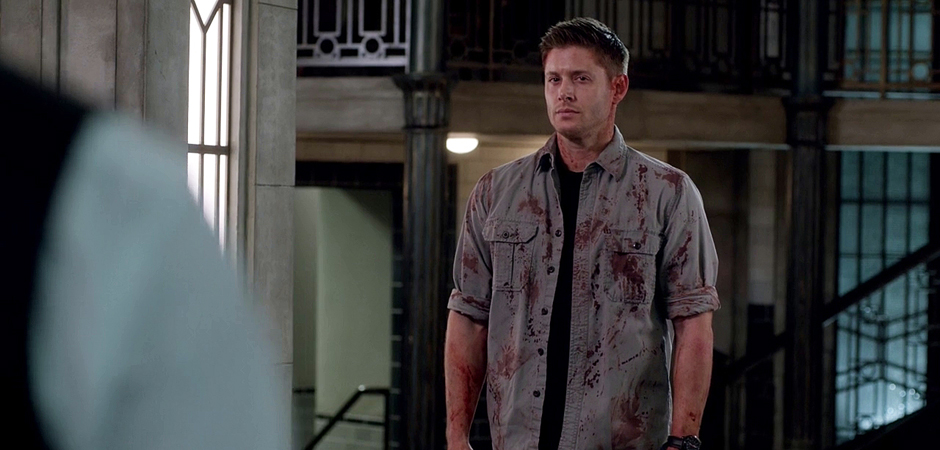What do you escape into when the world gets too difficult? It can be movies, television, music, sports, or anything that makes you stop thinking about what around you weighs you down. I personally lose myself in science fiction television, specifically Supernatural, Doctor Who, and Sherlock (otherwise known to the Tumblr community as SuperWhoLock).
The most amazing thing about using these television shows to escape depression is, despite their otherworldly or outrageous circumstances, the characters are grounded and relatable. The Doctor, Sherlock, and Dean Winchester all very clearly have depression, and it manifests itself in very different ways with some similarities, making their mental illness very clear. My first love—these shows—quite frankly saved my life.

Supernatural
First up we’ve got Dean Winchester from Supernatural. There is a fine line between hiding and healing, especially in the context of using art or other external means to escape from what goes on in your mind. And, for me at least, Supernatural was and is healing.
The beautiful thing about science fiction is that you can escape into a world that is different enough from your own to disconnect with the hardships of your own life and connect with emotions and trials of someone fictional.
Sci-fi allows us to see ourselves as we are and, at the same time, idealize, dream, and seek out who we want to be. Is Dean Winchester a very depressed young man, who very literally has the weight of the world on his shoulders? More often than not, yes.
But he’s also a big brother—strong, caring, and fiercely loyal to those he loves.
He’s damaged, but he manages to turn that trauma and pain into an aggressive and sometimes unhealthy need to help and care for others. Dean Winchester is the ultimate martyr. He often feels lonely and broken, but he keeps fighting because he knows that the world, and Sam and Cas, would be worse off without him. Dean’s depression often manifests itself as self-medication in the form of drinking and sex. Dean is a perfect example of destructive behavior that can come from trying to handle your mental illness. Not to say that hiding yourself in television shows is super healthy, but it’s certainly not the worse way to cope.

Doctor Who
Secondly, we have the Doctor, of which there have been many different portrayals. The beautiful thing about the show and the character is that the Doctor’s main traits stay the same no matter who has taken up the mantle.
Speaking only in the context of the reboot, it becomes increasingly clearer that the Doctor is a depressed and lonely alien. Believing he is the last of his kind, all he ever wants is to find someone to travel with him. But, even when he does, eventually everyone he comes to care about either dies or needs to move on with their life, and the Doctor is alone again.
He’s got abandonment issues and, because of the guilt that he carries with him over the destruction of Gallifrey, he travels the universe saving every person and planet that he can. Another thing I have found in my own struggles and in the struggles of loved ones that have the same dark cloud looming over them is that, when you feel lonely and helpless, you try to do everything that you can to prevent others from feeling the same way.
That trait describes the Doctor to a T. He’s unable to help himself, so he helps others and his companions, simultaneously saving himself and breaking himself by doing so.

Sherlock
Lastly, we have Sherlock, a genius who alienates everyone who cares about him by blatantly flaunting his intelligence. There are many people in his life who love him, but none of them really get the chance to get close to him. With the exception, of course, of John Watson.
When Sherlock finally finds Watson, someone who can appreciate his intelligence without looking upon him as if he were a freak, Sherlock latches on. He and Watson begin their, at times, very codependent friendship.
Sherlock relies on John far more heavily than John relies on Sherlock, but both definitely have their moments. Sherlock looks to John to keep him in line, asking him often if what he had just spouted off was rude or not (much like the Doctor and Rose).
He also expects John to do the grocery shopping and tag along whenever he has a case. More than that, John is there for companionship whenever Sherlock deems it necessary. Sherlock has a habit of going silent for days and not acknowledging or recognizing whether or not John is even there with him.
Now, we could credit this to his mental illness, or we could credit it to another viable theory that Sherlock is on the spectrum of social disorders. Either way, there are other factors that point to Sherlock being severely depressed.
He often self isolates, which is a very common way of coping with mental illness (one that I am not at all guilty of). Sherlock also has a great deal of trouble expressing his emotions despite being fully capable of analyzing the emotions of others. Now, like everything else, depression manifests itself differently in men than it does in women. Every person experiences it and copes with it differently. Sherlock very clearly cares about John, and Mrs. Hudson, and the Woman, but he’s largely incapable of expressing those emotions verbally. But, he’ll defend them and save their lives. Ya know, the little things.

The lead characters in these three iconic TV shows are a beautiful example of how to depict depression and mental illness without making the show itself about depression and mental illness. They allow the audience to see ourselves in the characters while also letting us escape from our own minds.


Comments are closed.